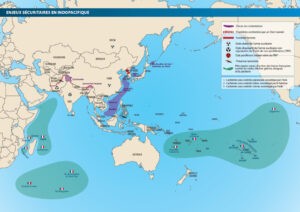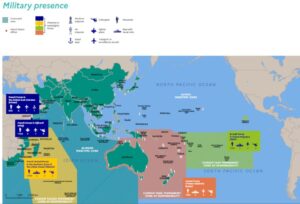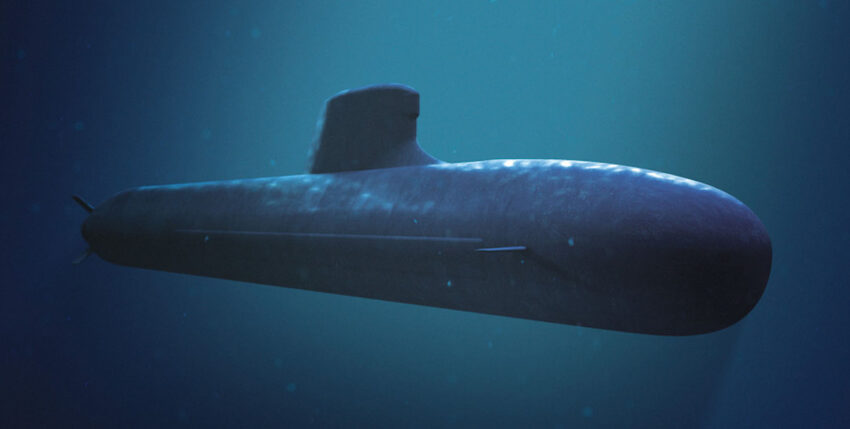Comment: AUKUS caused an uproar due to France's attempt to push the Australian-British-American security agreement into an arms deal. There are lessons to be learnt for Brussels and Berlin from this process.
Last week's surprise announcement of a new security agreement between the USA, Great Britain and Australia triggered strong reactions in France. However, even after a week, the uproar that has reached the EU leadership is directed less against the pact than against the cancellation of a security agreement that was announced in the same breath. Submarine construction programme. Even moderate media outlets such as the FAZ fail to differentiate between the two: they emphasise the US going it alone in Afghanistan and link it to the collapsed French deal. "... and now a submarine cooperation with Great Britain and Australia without consulting the EU," can be read in the FAZ 'Frühdenker' of 22 September 2021.
Caught off guard by the announcement of a nuclear submarine deal with the US and the UK and the subsequent cancellation of their own agreement, the anger in France was palpable until the phone call between Emmanuel Macron and Joe Biden on 22 September. Feeling abandoned by God (in France!) and the world, Parisian elites linked security issues with French trade and industrial interests. It seemed as if they were basking in staged disappointment. Defence Minister Florence Parly called off a meeting with her counterpart Ben Wallace in the context of Franco-British defence cooperation. A series of planned events with the United States, including one to mark the 240th anniversary of the Battle of Chesapeake Bay, which paved the way for American independence, were cancelled. The narrative that America could not be trusted prevailed to such an extent that even a withdrawal from NATO was on the cards.

The diversification of the trade and industrial policy failure emanating from Paris into the question of where Washington stands in terms of security policy has made its way into the EU's top echelons. European commentators are raising doubts about how important Washington's 'old allies in the EU really are'.
There have certainly been a few too many defence policy setbacks for France recently. Although Greece opted for French Rafale aircraft, it is still hesitant when it comes to naval units. Switzerland favoured the American F-35, not the Rafale. Previously Belgium. Now a cancellation from Australia. Whereby the 'strategic partnership' with the fifth continent, which was emphasised when the contract was signed, was probably more French wishful thinking than political reality.
AUKUS - more than just a submarine construction programme
This includes 'ACCUS', now welcomed by many countries bordering the Indo-Pacific, far more than the now cancelled submarine deal with France. The pact is intended to enable the three countries to exchange information and develop and share expertise in key technology areas (artificial intelligence, cyber, underwater systems, long-range strike capabilities).
At this point, it is worth remembering that several security and defence policy constellations were formed in the Pacific in the aftermath of the Second World War. ANZUS celebrated its 70th birthday on 1 September. The quadrilateral security dialogue QUAD brings together Australia, India, Japan and the USA. Within the Five Eyes Intelligence Oversight and Review Council (FIORC), better known as 'Five Eyes', Australia, Canada, New Zealand, the United Kingdom and the United States exchange intelligence information and work together in the field of signals intelligence. The USA also maintains close bilateral security relations with individual nations, such as Japan and South Korea. During the Cold War, the focus was on the threat posed by the Soviet Union, in particular the Soviet air force and the Soviet Pacific Fleet.
For Washington, defence cooperation in the Pacific is a component of its security policy that is often overlooked in the discussion of America's ties to Europe. From the US perspective, the new alliance is an attempt to integrate Australia and the UK into the broader American efforts to counteract Chinese hegemonic endeavours.
It is also a fact that the three ACCUS-partners obviously see different priorities. In announcing the partnership, the Australian Prime Minister and the American President emphasised security in the Indo-Pacific. Boris Johnson emphasised the historical ties with Australia and the defence and arms policy advantages.
Foreseeable move and Europe's wishful thinking

Consequently ACCUS As a security agreement, it is an element of its security policy construct in the Pacific and is nothing more than a further building block in the US's westward orientation. And in its positioning vis-à-vis China. This approach is not new and not surprising. Joe Biden is the third American president to direct the US focus towards this part of the world and allocate resources to it. President Barack Obama started it. In contrast, European governments continued to base their strategies and approaches on the pre-existing status quo. Europe hoped that relations between the two superpowers would remain stable and that Europe could balance its interests between the two. "Europeans want to postpone the moment of truth, not choose between the two," Thomas Gomart, Director of the French Institute of International Relations (IFRI), described it in the New York Times.
At the latest with ACCUS the time has come for Europe to recognise the general situation and translate it into tangible policy. After all, the USA is also looking to align itself with its partners. "Our security, our prosperity and our freedoms are, in my view, more interconnected than ever before," the US President assured the UN General Assembly, albeit with no direct reference to the affair.
Despite poor service: In AUKUS An opportunity for Europe
For France, and as its overarching organisation for the EU ACCUS also an opportunity. The French overseas territories in the Indian and Pacific Oceans are French territory. This means that the EU shares borders with Australia and New Zealand in the Pacific, as well as with African states (including South Africa) in the Indian Ocean. However, the Indo-Pacific Strategy published by the EU Commission on 16 September provides too few answers to the security questions. In contrast, it seems only understandable that Australia, whose relations with China have deteriorated, sees a stronger deterrent effect in cooperation with the UK and the USA.
For its part, the EU now has the opportunity to demonstrate not only its intentions in the further negotiations on the trade agreement with Australia, but also its size. The Commission has been negotiating the free trade agreement with Australia since 2018. The 12th series of meetings is scheduled for the autumn and was up for discussion due to the cancellation of the submarine construction programme.
As painful as the industrial and armaments policy setback with the cancellation of the Australian-French submarine construction programme is for the EU, the three ACCUS-The EU partners could indeed be criticised for not having included France - and therefore the EU - as a partner from the outset due to its legitimate interest in the Pacific. The historians will find out later whether the Brexit triumph or 'Global Britain' led to the London pen.
It remains to be seen how US Secretary of State Antony Blinken's announcements will now be translated into tangible results. "We welcome European countries playing an important role in the Indo-Pacific," he said at a press conference, noting in particular the importance of Paris' contribution to the region. In response to a question, he added: "We want to find every opportunity to work more intensively with France and other European nations in the Indo-Pacific". Washington will have to be measured against this.
Reflections on the Australian selection decision
The Australian-French submarine construction programme had been creaking for some time. The emerging problems became the subject of parliamentary hearings. In June, the Minister of Defence informed Parliament that "contingency planning" for the programme was underway.
Since 2016, when the Franco-Australian submarine construction programme was launched, tensions in the region have increased. For the Australian government, the procurement of new, powerful submarines has become more urgent. Especially as it has been negligent in its defence planning for future submarine capabilities over the last ten to fifteen years. A possible upgrade of the Collins class currently in service was delayed. Previous decisions were revised in a rigorous reassessment.
Nuclear-powered submarines were already a possible option for Canberra before 2016. At that time, the construction of a civilian reactor to produce the fuel rods was also considered. These considerations were rejected. Now they are active again - at least for the submarine part.
Operationally, the choice of nuclear-powered submarines (SSN) appears questionable. As they are expensive, their number is limited. There is currently talk of seven boats here and eight there - for comparison: twelve boats were planned in the programme with France. Today, the Australian Navy operates six submarines. The price for the American Los Angeles-class submarines is quoted at 900 million US dollars (1990 parity), which corresponds to 1.860 billion US dollars (1.585 billion euros) today. The Royal Navy's Astute boats are said to cost 1.3 billion. The extent to which these prices can be compared with the approach for the twelve boats proposed by France, totalling 37.15 billion euros, depends on the overall calculation. Weapon systems and other equipment features are not always priced in. In this respect, a simple comparison of the estimates is not cheap.
The vastness of the sea routes to Australia and the choke points to be controlled make seven or eight submarines seem just right for the defence of the country. On the other hand, nuclear-powered submarines (and a sub-hunting capability) have the range and endurance to be effective for long-range operations in conjunction with a potent partner. Against this background, the future Australian nuclear-powered submarines appear to be a kind of long-term commitment to the USA. Assuming that their involvement in the Western Pacific lasts a long time. In terms of operational considerations, it may be decisive for Canberra that an SSN offers greater advantages in tying up Chinese naval units in the Western Pacific than a conventionally powered submarine.
In addition to political motives, the technical disadvantage of having to be 'refuelled' after some time spoke against a French SSN. The French Rubis-class SSNs have a seven-year refuelling cycle. As the country has no nuclear industry, it would have meant that Australia would have had to have the changeover carried out in France. The reactors on the American and British boats are closed and do not need replacing.
In addition to becoming dependent on the nuclear expertise of the United States and the United Kingdom, Australia will also be forced to put its existing Collins-class submarines on a life support programme to keep them in service until the mid-2040s. The Prime Minister, in announcing ACCUS stated on 15 September that the first SSN will be built in Adelaide and "completed by 2040". A leasing option for an (American or British) SSN is already being discussed in Australia.
Contractual
On social media and elsewhere, Australia is often accused of breaking the treaty. Which is not necessarily true. In reality, Australia awards the construction contract to someone else after the concept phase. The details of the contract design are not known. Cost increases and delays, which could be fixed in detail, may suggest an exit from the contract. "It cannot be ruled out that the contract contains special cancellation rights that would have allowed the Australian government to withdraw from the project. Such termination rights can be agreed, for example, if milestones are not reached or budget ceilings are exceeded," says Dr Daniel Soudry, specialist lawyer for public procurement law.
According to its own statements, Naval Group is in negotiations with the Australian government regarding compensation. According to a commentary quoted by Reuters, "Naval Group has honoured its obligations to the Commonwealth of Australia. This was confirmed to us in the termination for convenience letter we received."
EU's dream of strategic autonomy
The case shows once again how quickly defence deals can slip into political nirvana. MEP Bernd Lange, Chairman of the European Parliament's Trade Committee, calls for "the EU's strategic autonomy to be expanded and our own economic, political and security policy interests to be defined" in connection with the collapse of the Franco-Australian submarine construction programme. The demand for strategic autonomy for the EU is not tenable. For one thing, unlike in the USA, there is no European industry, despite all attempts by Brussels. Every European company does its own business. As long as it remains organised on a national level within the EU, individual action, supported and even subsidised by national governments, will continue to flourish. This applies to trade with China as well as to defence agreements. Under the constitutional circumstances, the EU institutions can only provide a framework. Europe does not act and work monolithically like the USA, for example.
And in military terms, Europe is a long way from strategic autonomy. In this respect, we must be careful not to alienate our American friend with such buzzwords. Despite its peculiarities, it is needed - keyword nuclear deterrence. Ultimately, with ACCUS This is a further wake-up call for the EU that Europe's security policy implications play a subordinate role in Washington. Accordingly, the USA's expectations are that Europe will have to face up to the challenges in its own environment. It's about time!
Lessons for Berlin
On the other hand, the reactions in Paris should make those in Berlin aware of the importance of defence relations and agreements in France. Not only do they represent an economic factor and maintain jobs, they are almost an element of national honour. In this respect, Germany has a responsibility not to repeatedly put joint defence projects to the test. If Berlin continues to be interested in good relations with its neighbouring country, then signals are needed that Germany will stand by the commitments it has made. U-turns, such as on the issue of the future maritime patrol aircraft/U fighter aircraft (MWAS), could lead to irritation.
There is no hiding the fact that there are concerns on the other side of the Rhine about the Germans' loyalty to the treaty. La Tribune asks in an article on 23 September 2021 what will remain of the five iconic programmes of July 2017. "But the Germans have already broken their commitments on MAWS, the joint maritime surveillance aircraft programme, by buying from Boeing; they will soon officially announce the abandonment of the refurbishment of the Tiger helicopter in order to buy from Boeing again (this is necessary to help Airbus' rival out of the crisis)."







